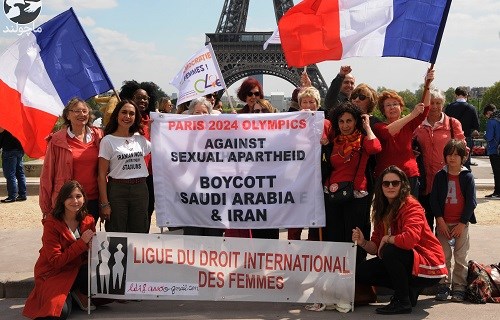Campaign calls for sports boycott of Iran and Saudi Arabia over sexual segregation in sports

A campaign against sexual apartheid in sport was launched in Paris on 13 April. Photo: www.clef-femmes.fr
20.04.2017
By Play the GamePractices related to the inclusion of women in sports in Iran and Saudi Arabia do not comply with fundamental rights, says a campaign launched on 13-14 April in Paris.
According to the campaign, which is led by the League for International Women’s Rights and the French Coordination for the European Women’s Lobby, the international sports movement has failed to tackle sexual apartheid in sports.
The sexual segregation addressed in the campaign includes the fact that women in Iran and Saudi Arabia have no access to stadiums and that there are limitations to women’s participation in international sports competitions, e.g. to specific sports, events or requirements for attire.
In Saudi Arabia, sports and gymnastics are forbidden activities for girls in public schools and the country also lacks an infrastructure enabling women to practice sports, says the campaign material.
While international sports has taken a stand against racial apartheid and government interference on a number of occasions by sanctioning countries like South Africa and Kuwait, sexual apartheid has not had the same consequences yet. And, although international sports bodies have addressed some of the discriminatory situations in the two countries, the efforts have so far not been more than “weak pressure”, the coalition says and calls for a boycott of countries that exert sexual apartheid.
“We demand a sports boycott of these countries, and that federations and international officials firmly condemn and punish these practices and promote and effectively apply a charter of religious and political neutrality,” says the campaign material.
The charter would advocate 1) to prohibit all political or religious signs or demonstration on sports sites, 2) to favor ‘gender mixing’ when practicing sports and ban ‘gender grouping based on religious requirements’, and 3) “to prohibit any sports contact with countries which practice sexual segregation in sports”.
The campaign refers to both the international UNESCO charter of physical education, physical activity and sports and the Olympic Charter as basis for its call as both international documents state that the practice of sports is a human right regardless of gender.





